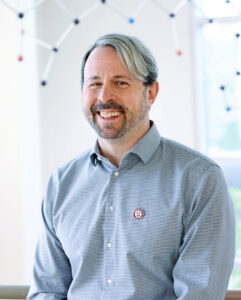
The University of Utah Graduate School created the Distinguished Mentor Award to honor those who have demonstrated exceptional commitment to the mentorship of graduate students and postdoctoral scholars. Nominations for this award are submitted by current and former graduate students, postdoctoral scholars, faculty, and members of the campus community, which are then reviewed by an interdisciplinary selection committee composed of faculty. Finally, awardees are selected by the Dean of The Graduate School based upon recommendations of this committee. Up to three awards are made each year, and recipients of The Graduate Student and Postdoctoral Scholar Distinguished Mentor Award will receive a prize of $2,500.
Professor Matt Sigman, Distinguished Professor at the Department of Chemistry, has been selected as one of the three recipients of this award for 2025.
Sigman’s research program marries physical organic chemistry techniques and data science to develop new reactions with broad applications; from enantioselective synthesis, to energy-related topics, to biologically inspired reactions. Their unique approach to data chemistry not only enables reaction design in the areas described above but ultimately helps scientists understand the fundamental guiding principles by which the performance of these reactions is achieved by relating structure to function.
Since starting at the University of Utah in 1999, Sigman has mentored over 150 postdoctoral, graduate, and undergraduate coworkers. His research program marries physical organic chemistry techniques and data science to develop new reactions with broad applications; from enantioselective synthesis, to energy-related topics, to biologically inspired reactions. Their unique approach to data chemistry not only enables reaction design in the areas described above but ultimately helps scientists understand the fundamental guiding principles by which the performance of these reactions is achieved by relating structure to function.
“Our science has transitioned from a traditional, inward-looking research group to an extensive collaborative network with both academic and industrial teams (we currently work on >30 collaborative projects worldwide!). This means the team works on exceptionally diverse projects and the lab atmosphere requires collaboration and flexible problem-solving for successful project outcomes,” says Sigman.
When discussing how he navigates such a work environment as a mentor, Professor Sigman shared, “This is a time in life where many mentees are also discovering what excites them professionally and how to excel in a complex workspace, and each has their own path. I often point to my experiences and how I am still learning ways to be a better scientist, person, father, and teacher – I can confidently say I’ve learned from each person I’ve worked with.”
Congratulations to Professor Sigman on receiving this well-deserved award!
Read about the Sigman Lab.
Read about the Distinguished Mentor Award.
4/23/2025
